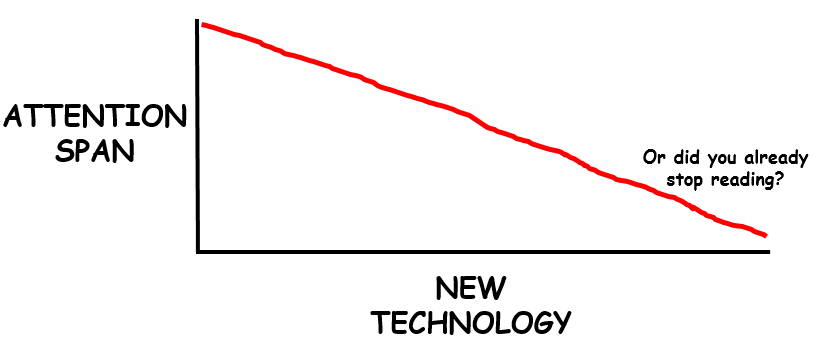

The Attention Span of a Goldfish
Awhile back, I wrote an installment of TRUTH: In 1000 Words or Less on the topic of the continual and pervasive migration of people to Denver, Colorado, the place I’ve called home since 1999. Shortly after publishing that column, I received a comment from a realtor friend of mine from Denver, a comment that clearly demonstrated that while she may have read the first couple paragraphs of the piece, or maybe nothing more than the witty dangler that I had posted on Facebook, she certainly had not read the column in its entirety. You heard me correctly, this regular reader had the unmitigated gall to not finish reading my article and then comment on it. And how did I know? Because her comment suggested that I should be more open to the Denver population boom, even though I had made exactly that point in the clever twist I had saved for the conclusion of my essay. The lesson to be learned from all this: always read to the end of TRUTH: In 1000 Words or Less: I often save my best words for last.
A couple of weeks later, I ran into this friend at a local farmer’s market in the Highlands neighborhood outside of downtown Denver. I started giving her grief about not reading to the end of the column, just a humorous, good-natured ribbing aimed at making sure she did not repeat this inexcusable lapse of judgment. She took my teasing amicably but responded with a retort I simply did not expect, “I absolutely love your writing, Steven, but you know, sometimes a thousand words is just a bit too much to read.”
Are you kidding me? A thousand words is too much for you? For those of you who read me on the website Medium, you know that my column is generally calculated as approximately a four to five minute read. Is this the point we have gotten to as a society? That four to five minutes of reading is simply too much in just one sitting? If so, we should have some serious concerns about where we might be headed.
 Sadly, recent scientific research suggests the problem might be even worse than my readership issue might suggest. A 2015 study, ironically performed by Microsoft, found that the average attention span for a human being had dropped precipitously in the last couple of decades from 12 seconds in 2000 to a current span of just 8 seconds. That’s right, our current attention span is actually one second shorter than the average attention span of a goldfish, which means that even a golden retriever distracted by a squirrel in the tree next door can focus longer than your teenage son.
Sadly, recent scientific research suggests the problem might be even worse than my readership issue might suggest. A 2015 study, ironically performed by Microsoft, found that the average attention span for a human being had dropped precipitously in the last couple of decades from 12 seconds in 2000 to a current span of just 8 seconds. That’s right, our current attention span is actually one second shorter than the average attention span of a goldfish, which means that even a golden retriever distracted by a squirrel in the tree next door can focus longer than your teenage son.
And while I meant nothing by the gender denotation in referencing your teenage son, it was definitely a commentary on generational differences because while only 10% of those over the age of 65 answered in the affirmative to the prompt, “When nothing is occupying my attention, the first thing I do is reach for my phone,” that number was alarmingly dwarfed by the 77% of 18-24 year olds who agreed with the statement. And that’s just the problem.
More and more, as our society transitions to a digital era of communication, we receive our information in bits and pieces. We have become a culture of tweets and posts, where statements are made in 140 characters or less. We no longer have a tolerance for an actual news article or opinion piece, preferring instead to relegate our reading to short blurbs often framed by those with equally short attention spans and even less actual knowledge. And yes, you know exactly whom I referring to with that last comment. The average internet video is only 2.7 minutes long, and while the average webpage has about 593 words on it, studies suggest that we actually read only 28% of them. And then we wonder why are so horribly misinformed about the realities of the world around us.
Sure, the internet and modern technology can be wonderful resources for information. There is definitely something to be said for being able to look up who the other member of WHAM was with the touch of a single button, but sadly, the problem with this means of interacting with our world is that it also saps our diligence for doing some actual research to fully explore and understand a given topic. We have become a culture of immediate knowledge gratification, and if you can’t tell us what we want to know in 140 characters or less, well, screw it, we just don’t need to know about it all that badly. Oh and don’t go telling me you simply don’t have time to read a more lengthy column on the topic. If you have enough time to waste on surfing Facebook to troll your ex for seemingly hours on end, you have time to read a five minute article on Medium.
The concern is that most subject matter- the real issues that confront our modern society- aren’t as easily answered as that. Believe it or not, complex issues require deep thought, significant contemplation, and thorough research- none of which we are willing to give them. And so we come up with inadequate solutions to the true dilemmas we face. We espouse uninformed opinions and spout off on subjects of which we have little discernible knowledge. As the Avett Brothers famously declared, “Ain’t it like most people? I’m no different. We love to talk on things we don’t know about.”
And so, I will not shorten my column to gain more readers or acquiesce to the dwindling attention span of a reading audience too emerged in social media and digital nonsense to get to the end of a column. Instead I will use my thousand words to actually fully indulge a topic and help readers appreciate an at least sometimes articulate, thought-out exploration of a given theme, a theme I will admittedly probably know very little about. But hey, at least I’ll continue to get you to read a thousand words, and isn’t that purpose enough?
Steven Craig is the author of the best-selling novel WAITING FOR TODAY, as well as numerous published poems, short stories, and dramatic works. Read his blog TRUTH: in 1000 Words or Less every THURSDAY at www.waitingfortoday.com



